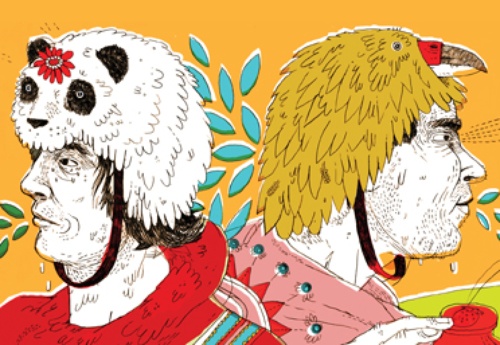
The Music We Hate: Animal Collective
"Animal Collective embody the entitled millennial generation, products of a coddled culture that gives undue praise to minimal effort and cherishes signifiers over content."
Illustration by Josh J. Holinaty
Remember that high school party where everyone was on acid except you—and you had no idea? You spent the whole night pretending you were cool and that of course you knew what was so fucking funny. Your friends acted like infantile aliens. You just wanted to slap them back to sanity. I go back to that party every time I listen to Animal Collective.
This Brooklyn export captured the imagination of the American underground in the last decade, reaching the apex of their popularity in 2009, when Merriweather Post Pavilion cracked Billboard’s Top 30, sold more copies than all their other records combined (131,000 in the US), and topped best-of lists. What was once a mildly irritating independent act now commands serious respect. And that must stop.
It’s easy to see why they’ve enraptured the zeitgeist of the aughts. Animal Collective draw from many of the top trends of the past ten years: the freak-folk movement that blossomed around 2003; the glitchy minimalism of electronic music; the playful exuberance that drives so much indie rock. All of which I love—and yet Animal Collective make me wonder if I ever liked any of those things in the first place. Never mind that there are countless acts who do this better: Flaming Lips, Caribou, Fuck Buttons, Tyondai Braxton, Espers, Dirty Projectors. Why do Animal Collective get it so horribly wrong?
The band’s members met in junior high in tony suburban Baltimore, where they went to private school, took LSD, listened to the Grateful Dead, roamed in the woods and started making noise. Literal noise, that is: abrasive sound experiments that they would later embellish with Beach-Boyish vocal harmonies and acoustic guitars. After relocating to New York to attend NYU and Columbia, main songwriters Avey Tare and Panda Bear worked at the best record store in Manhattan, Other Music, which guaranteed them an audience capable of elevating unremarkable home recordings to buzz-band status. (It’s curious that Vampire Weekend have become whipping boys for growing up educated and privileged, while Animal Collective avoid such criticism entirely.)
The band’s earliest albums are shapeless sonic blobs, coloured with high-pitched tones that could clear your house of vermin; the songs are little more than Manson-family ramblings on Quaaludes. As experimentation, it’s amateurish. As mood music, it’s torturous. As actual songwriting, it’s embarrassing.
Things shaped up a bit for Animal Collective’s 2004 breakthrough, Sung Tongs, if only because they learned how to sing. Now they simply sounded like Ritalin kids rather than acid dropouts. Critics compare Animal Collective to Brian Wilson for their wistful lyrical evocations of innocence lost and wisdom yet gained—even if their poetry is on par with that of a well-adjusted emo kid who’s just discovered experimental music. (Their discography gets marginally more tolerable as time goes by, but that hardly makes up for years of criminal music-making.)
Obviously I sound like a grumpy thirty-eight-year-old man here. In a puzzling 2009 year-end essay for the Village Voice, Mike Powell enjoys the fact that Animal Collective inspire a generational divide, which is a straw-man argument. (I loathe the Dave Matthews Band as well; is that generational?) Powell claims that the band’s “solipsism becomes a strength.” Which helps clarify why they are such an irritant: Animal Collective embody the entitled millennial generation, products of a coddled culture that gives undue praise to minimal effort and cherishes signifiers over content. And so we have Animal Collective making pop music devoid of melody, psychedelia that sounds colourless, folk music for flunkies, dance music that’s undanceable.
Related on maisonneuve.org:
—The Music We Hate
—The Music We Hate: Online Supplement
—Born Here
Subscribe — Follow Maisy on Twitter — Like Maisy on Facebook





